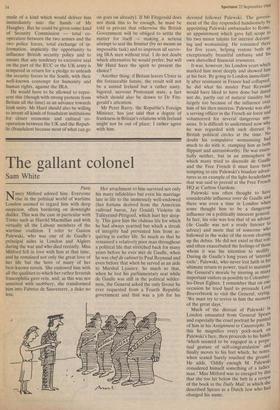The gallant colonel
Sam White
Paris Nancy Mitford adored him. Everyone 1 14 else in the political world of wartime London seemed to regard him with deep suspicion, often bordering on downright dislike. This was the case in particular with Tories such as Harold Macmillan and with virtually all the Labour members of the wartime coalition. I refer to Gaston Palewski, who was one of de Gaulle's principal aides in London and Algiers during the war and who died recently. Miss Mitford fell in love with him at that time, and he remained not only the great love of her life but the hero of many of her best-known novels. She endowed him with all the qualities to which her rather feverish francophilia gave rein, and, as this was not unmixed with snobbery, she transformed him into Fabrice de Sauveterre, a duke no less. Her attachment to him survived not only his many infidelities but even his marriage late in life to the immensely well-endowed (her fortune derived from the American railroad baron, Jay Gould) Violette de Talleyrand-Perigord, which hurt her deep- ly. This gave him the chateau life for which he had always yearned but which a streak of integrity had prevented him from ac- quiring in earlier life. So much so that he remained a relatively poor man throughout a political life that stretched back for many years before he ever met de Gaulle, when he was chef de cabinet to Paul Reynaud and even before that when he served as an aide to Marshal Lyautey. So much so that, when he lost his parliamentary seat while de Gaulle was still in the political wilder- ness, the General asked the only favour he ever requested from a Fourth Republic government and that was a job for his devoted follower Palewski. The govern- ment of the day responded handsomely by appointing Palewski ambassador to Rome, an appointment which gave full scope to his two minor talents for interior decorat- ing and womanising. He remained there for five years, helping restore both an exceptionally beautiful embassy and his own shrivelled financial resources.
It was, however, his London years which marked him most deeply and showed bun at his best. By going to London immediate- ly after resistance in France had collapsed, he did what his master Paul Reynaud would have liked to have done but dared not do, partly out of natural timidity but largely too because of the influence over him of his then mistress. Palewski was also a serving officer in the French air force and volunteered for several dangerous mis- sions. It is difficult to understand now why he was regarded with such distrust in British political circles at the time. No doubt his compulsive womanising had much to do with it, stamping him as both flippant and untrustworthy. He was essen- tially neither, but in an atmosphere in which many tried to discredit de Gaulle and the Free French it must have been tempting to cite Palewski's boudoir adven- tures as an example of the light-headedness that was said to prevail at the Free French HQ at Carlton Gardens.
Palewski was often thought to have considerable influence over de Gaulle and there was even a time in London when some thought him to be a dangerous influence on a politically innocent general. In fact, his role was less that of an adviser (de Gaulle was not a ready listener to advice) and more that of someone who followed in the wake of the storm clearing up the debris. He did not excel in that role and often exacerbated the feelings of those whom it was his intention to mollify. During de Gaulle's long years of Internal exile', Palewski, who never lost faith in his ultimate return to power, tried to maintain the General's morale by steering as many important visitors as possible to Colombey- les-Deux Eglises. I remember that on one occasion he tried hard to persuade Lord Beaverbrook to visit the General, saying, `We must try to revive in him the memorY of the great days.' Much of the distrust of Palewski in London emanated from General Spears and especially the cruel portrait he painted of him in his Assignment to Catastrophe. In this he magnifies every pock-mark on Palewski's face, then proceeds to his hands `which seemed to be engaged in a perpe- tual gesture of self-congratulation' and finally moves to his feet which, he notes, when seated barely touched the ground: He adds, 'Oddly enough M. Palews19 considered himself something of a ladies' man.' Miss Mitford was so enraged by this that she too hit below the belt in a review of the book in the Daily Mail, in which she .described Spears as a Dutch Jew who had changed his name.










































 Previous page
Previous page